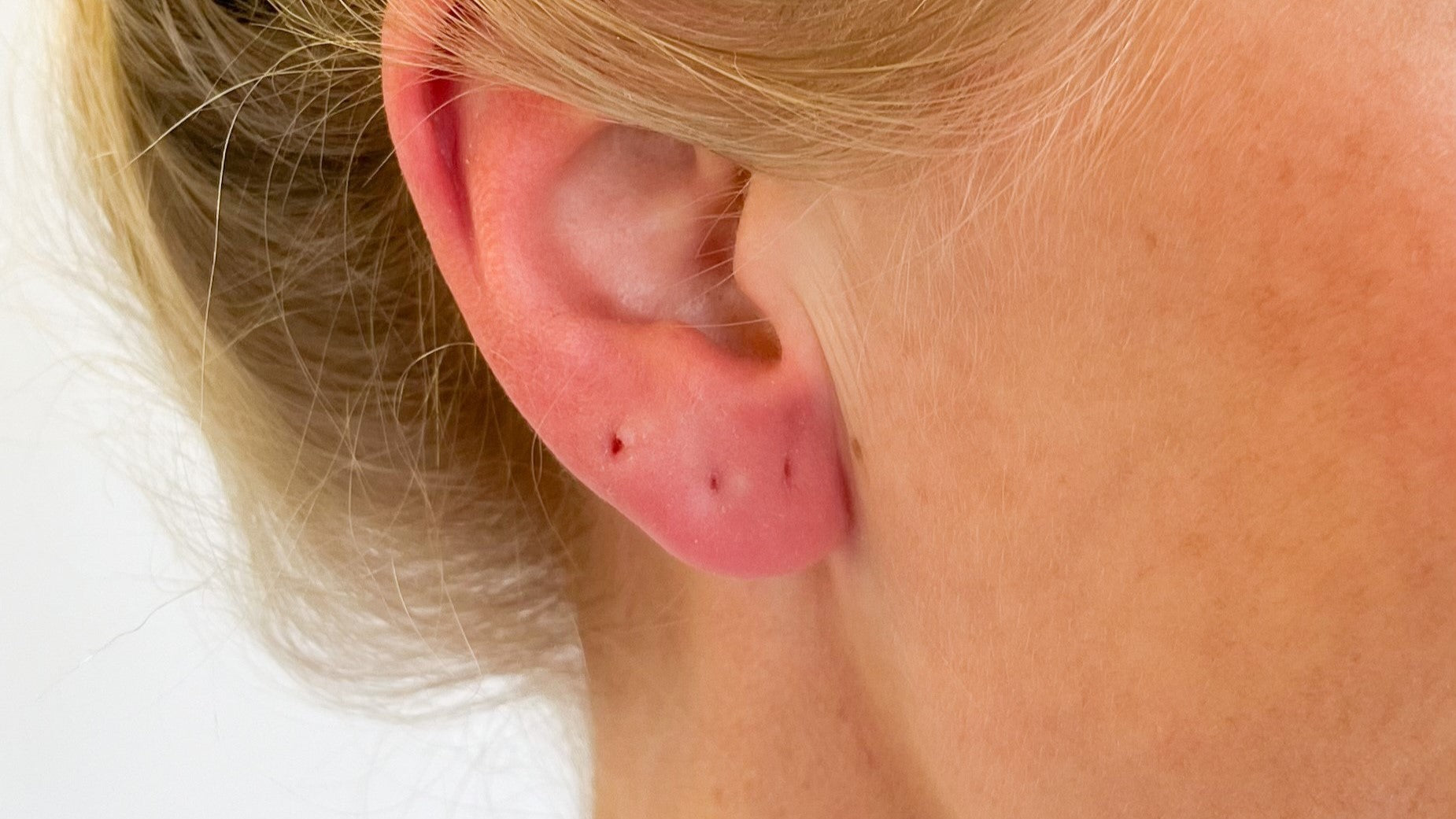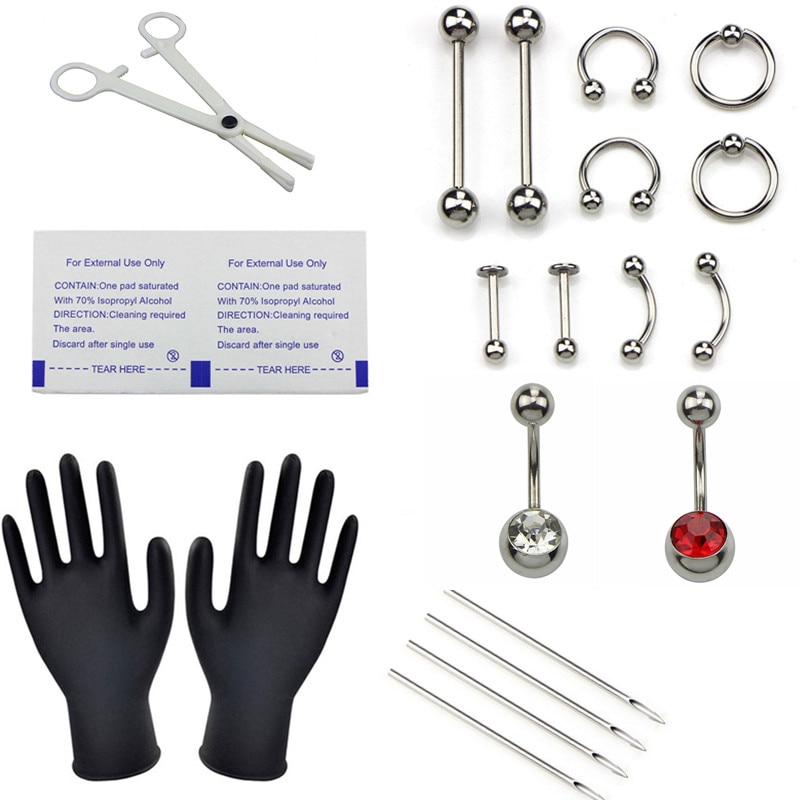Views: 23 Author: Site Editor Publish Time: 2023-04-19 Origin: Site
Piercing jewelry is a popular way to express your personal style and enhance your appearance. However, piercing jewelry also comes with some risks and challenges that you should be aware of before you get pierced or change your jewelry.
In this article, we will discuss some of the common complications that can arise from piercing jewelry, as well as some tips on how to prevent them and choose the right jewelry for your healed piercings.
Any type of piercing poses a risk of complications, including:
Allergic reactions. Some piercing jewelry — particularly pieces made of nickel — can cause allergic reactions. This might result in itching, swelling, redness or rash around the piercing site. If you have a history of metal allergies, you should avoid nickel-based jewelry and opt for hypoallergenic materials such as titanium, surgical steel, gold or platinum.

Oral complications. Jewelry worn in tongue piercings can chip and crack your teeth and damage your gums. Tongue swelling after a new piercing can interfere with chewing and swallowing — and sometimes breathing. To prevent oral complications, you should choose jewelry that fits properly and does not rub against your teeth or gums. You should also avoid playing with your jewelry or biting on it.
Skin infections. This might cause redness, pain, swelling or a pus-like discharge after a piercing. Skin infections can be caused by bacteria, fungi or viruses that enter the piercing site through contaminated equipment, jewelry or hands. To prevent skin infections, you should always go to a reputable piercing studio where employees are properly trained and use sterile equipment and jewelry. You should also follow the aftercare instructions given by your piercer and keep your piercing site clean and dry.
Other skin problems. Piercing can lead to scars and raised areas caused by an overgrowth of scar tissue (keloids). These can be unsightly and difficult to treat. You should also avoid changing your jewelry too often or wearing jewelry that is too heavy or tight for your piercing.
Bloodborne diseases. If the equipment used to do the piercing is contaminated with infected blood, you can contract various bloodborne diseases, including hepatitis B, hepatitis C, tetanus and HIV. These diseases can have serious and sometimes fatal consequences for your health. To prevent bloodborne diseases, you should make sure that your piercer uses disposable gloves and needles and sterilizes all reusable tools and jewelry before each use. You should also avoid sharing your jewelry with others or using unsterilized jewelry from unknown sources.
Tearing or trauma. Jewelry can get caught and torn out accidentally, potentially requiring stitches or other repair. This can happen when you wear clothing or accessories that snag on your jewelry, or when you engage in physical activities or sports that involve contact or friction. To prevent tearing or trauma, you should remove your jewelry or cover it with a bandage when doing activities that might cause injury to your piercing. You should also choose jewelry that is smooth and secure and does not have dangling parts.

If you like the body jewelry you're wearing, it fits properly, and is of high quality, then it can be worn indefinitely. But the form and function of initial body jewelry are all about safety, so your choices are limited.
After your piercing has healed, you have countless options and it should be safe to replace your jewelry when all of the following conditions are met:
It is not tender
The minimum initial healing time has passed
Your piercing is no longer secreting and getting crusty
The size, material, quality, and style (along with the weight and finish) contribute to whether a piece of jewelry is suited for daily wear in the body. Some are acceptable for only a few hours of dress-up fun.
When choosing jewelry for your healed piercings, you should consider the following factors:
Size. The size of your jewelry should match the size of your piercing hole. If the jewelry is too small, it can cause irritation or migration of the piercing. If the jewelry is too large, it can cause stretching or tearing of the piercing. You should measure the diameter or length of your current jewelry before buying new ones.
Material. The material of your jewelry should be compatible with your skin and not cause any allergic reactions or infections. Some of the most common and safe materials for piercing jewelry are titanium, surgical steel, gold, platinum, glass, and bioplast. You should avoid jewelry made of nickel, copper, brass, or other metals that can tarnish or corrode. You can also experiment with alternative materials such as horn, bone, wood, amber, stone, or silicone, but these may require more care and attention than metal or glass jewelry.
Quality. The quality of your jewelry refers to how well it is made and how smooth and polished it is. You should choose jewelry that has no sharp edges, cracks, pits, or uneven surfaces that can irritate your piercing or harbor bacteria. You should also look for jewelry that has secure closures and attachments that do not fall off easily. You can check the quality of your jewelry by inspecting it closely or asking your piercer for advice.
Style. The style of your jewelry is a matter of personal preference and expression. You can choose from a variety of shapes, colors, designs, and adornments for your piercing jewelry. However, you should also consider how the style of your jewelry affects the comfort and safety of your piercing. For example, you should avoid jewelry that is too heavy, bulky, or dangling for your piercing, as this can cause stretching, tearing, or snagging. You should also avoid jewelry that is too small, tight, or hidden for your piercing, as this can cause irritation or infection.